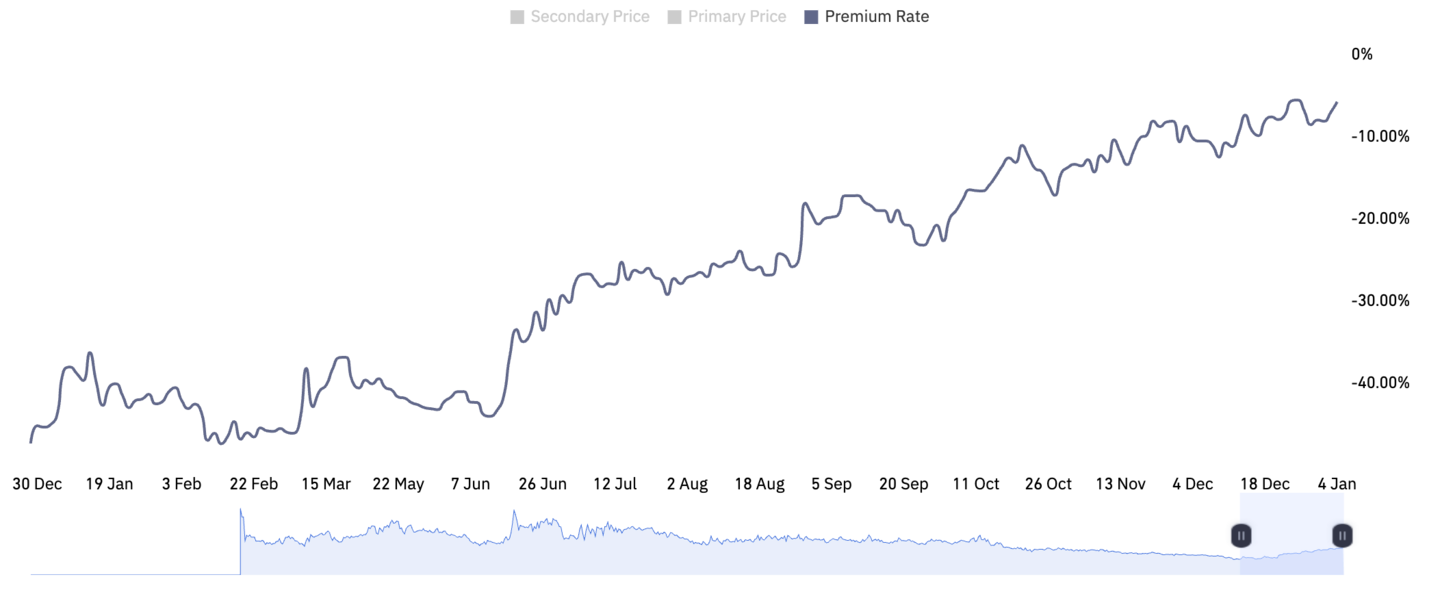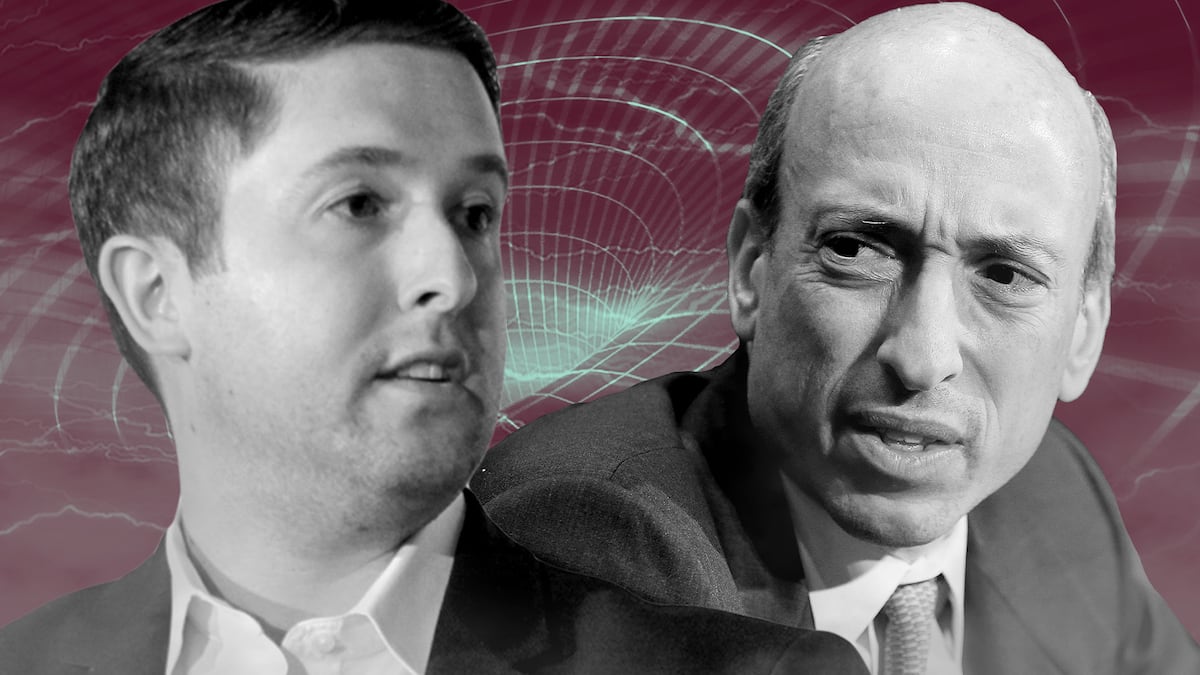- Grayscale developed a listed product that posted 300% returns in 2023.
- The firm also won a key legal victory against the SEC but now it faces an entirely new challenge.
- A fee battle looms as Wall Street players square off over potential new Bitcoin offerings.
This should be Grayscale’s moment.
The crypto asset management pioneer broke new ground when it offered the first listed Bitcoin fund, a trust, in 2013.
Yet now, with expectations mounting that US regulators are about to approve the first Bitcoin spot price exchange traded fund, Grayscale may be eclipsed by Wall Street giants such as BlackRock and ARK Invest.
The question now is how Grayscale pivots to a new marketplace crowded with rivals.
Wall Street piles in
For the last couple of years, Grayscale has been struggling to transform its Bitcoin Trust, which goes by the ticker GBTC, into a cheap and accessible exchange traded fund, or ETF.
Yet even as it was blocked by the US Securities and Exchange Commission, more than a dozen Wall Street firms have piled into the space with their own applications.
With analysts betting the SEC will green light one or more of those funds as soon as Friday, Grayscale must attract investors who might feel more comfortable putting their money with household names such as Fidelity and BlackRock’s iShares unit, or Cathie Wood’s ARK Invest.
Right out of the gate they’ll have an advantage — fees.
‘Grayscale’s ability to compete in the spot bitcoin ETF category will ultimately come down to how committed they are to lowering fees.’
— Nate Geraci, ETFStore
Grayscale charges investors in its flagship fund, GBTC, a 2% annual management fee. Fidelity’s proposed Bitcoin ETF is set to debut at 0.39%.
“Grayscale’s ability to compete in the spot bitcoin ETF category will ultimately come down to how committed they are to lowering fees,” Nate Geraci, president of financial advisory firm ETFStore, told DL News.
Fee war
Of course, Grayscale may very well charge a competitive fee for its own ETF, which is also in the pipeline with regulators.
The firm filed its form 8-A on Thursday, alongside other Bitcoin ETF hopefuls Fidelity and VanEck. This form is one of the steps required to register new securities with the SEC.
“At Grayscale, we continue to work collaboratively with the SEC to uplist GBTC to NYSE Arca as a spot Bitcoin ETF. Grayscale remains ready to operate GBTC as an ETF upon receipt of regulatory approvals,” a Grayscale spokeswoman told DL News.
But with Bitcoin expected to be a miniscule part of their trillions of dollars in assets, the heavyweights can afford to get into a fee war just to grab marketshare.
“I wouldn’t be surprised to see BlackRock undercut Fidelity on fees with their iShares Bitcoin Trust,” Geraci said. “Does Grayscale have the stomach to compete at that fee level? In my opinion, that will be the primary factor in determining whether they can hold off these traditional firms longer-term.”
To be sure, Grayscale’s predicament is freight with irony. It was the outfit, after all, that played such a crucial role in the fight for ETF approval in the first place.
Costly legal battle
And GBTC remains the largest Bitcoin investment trust in the world with more than $26 billion in assets under management at present — or about 620,000 Bitcoins.
The firm has waged a costly legal battle with regulators to convert GBTC into a spot Bitcoin ETF for years now. Following a rejection in 2022, Grayscale sued the SEC in an audacious effort to force its approval.
Grayscale won a huge victory in court this year by getting the rejection overturned.
But while it had sought to be the early mover and dominate the ETF market, now it will probably be approved alongside a host of rivals in what some analysts have dubbed the Cointucky Derby.
Big work week
It’s a “big work week ahead,” Grayscale CEO Michael Sonnenshein said in an X post on Tuesday, as the all important January 10 deadline approaches.
To prepare for its long awaited moment, Grayscale has made a number of moves in recent weeks to assuage the concern of regulators and marshal fund expertise for a new market.
Grayscale reshuffled its board of directors on December 26. Barry Silbert, CEO of its parent company Digital Currency Group, and Mark Murphy resigned from the asset manager’s board.
Grayscale was trying to show the SEC “it is being a good boy and worthy of making [its] first tranche of launches,” Eric Balchunas, a Bloomberg Intelligence analyst, tweeted at the time.
Grayscale also added John Hoffman, an ETF industry veteran who was previously head of Invesco’s Americas ETF division.
Narrowing discount
From the outset, Grayscale delivered a novel means for investors to garner access to Bitcoin’s performance without going to the trouble of owning the coin itself.
While institutional investors might be interested in digital assets, many were hesitant to trade them directly. GBTC and other publicly traded alternatives act as proxies for investing in digital assets and offer a safer route for these investors.
Their trust in GBTC paid off handsomely in 2023: GBTC gained more than 300% in 2023, outperforming Bitcoin itself by some margin.
Other Bitcoin-related concerns also beat the benchmark. Bitcoin miner Marathon Digital gained nearly 500% in 2023, Michael Saylor’s MicroStrategy added a little over 300%, and Coinbase’s stock soared by more than 350%.
GBTC’s mechanics
The renewed interest in GBTC helped to improve one of its key metrics: its discount to net asset value.
While retail investors may care little for this measure, institutional investors have come to rely on it as a barometer for the Bitcoin market.
Unlike ETFs, GBTC’s shares can’t be redeemed directly through the issuer. As a result, the trust has often traded at a discount or premium to its net asset value, which is the worth of the Bitcoin it holds.
Redeeming shares basically means destroying them, or removing them from circulation. Without a redemption programme an investor who wants to offload their GBTC shares has only one option — sell to another investor.
So when there is an abundance of selling the market price of GBTC shares disconnects from the share price and results in a discount to net asset value.
With ETFs the investor can always redeem the shares for their underlying value, so any discount or premium becomes insignificant.

GBTC’s discount provides a way to tell which way the wind is blowing in crypto. In the bear market of early 2023, for instance, the discount widened to about 47%. Then it reversed course as the price of Bitcoin jumped amid a buoyant mood in the capital markets.
When BlackRock applied to the SEC for approval of a Bitcoin ETF in June, the discount narrowed from to 33% from 44%. It closed the gap again after Grayscale won its court ruling in August, and as hope around approval of the ETF escalated.
Gauge of probability
The discount then became a gauge for the probability of approval, Coinbase’s David Duong said in October.
GBTC’s discount reached its lowest point on December 26 at 5.5%. The discount has widened somewhat over the past week to around 7%.
The discount would disappear if the fund were to convert to a spot Bitcoin ETF, Grayscale CEO Sonnenshein has said several times this year.
And a new era would dawn for the 10-year-old firm, and for crypto investors as well.
Adam Morgan McCarthy is a markets correspondent for DL News. Have a tip? Contact the author at adam@dlnews.com.
